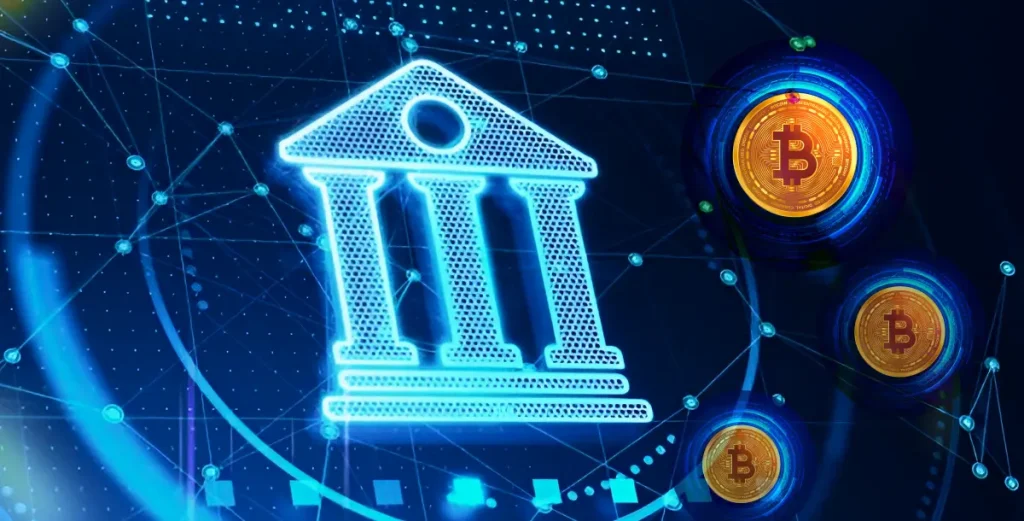The financial sector is undergoing a major transformation as traditional banks increase their investments in blockchain technology. According to a recent Ripple-backed report, global banks have invested over $100 billion in blockchain-related initiatives between 2020 and 2024, signaling a major shift toward digital assets.
The study, which analyzed 10,000+ blockchain deals and surveyed 1,800 finance leaders, found that banks are prioritizing digital asset custody, tokenization, and payment infrastructure, despite regulatory uncertainty. Key takeaways include:
- 65% of banks are actively exploring digital asset custody.
- 90% of finance executives believe blockchain will significantly impact finance by 2028.
- Payment infrastructure received the largest share of investments, followed by custody and tokenization.
While blockchain adoption is accelerating, most banks are focused on institutional infrastructure rather than retail crypto services—less than 20% currently offer crypto trading or consumer wallets.
Breaking Down Big Banks’ Boldest Blockchain Moves
JPMorgan’s Onyx & JPM Coin
JPMorgan has been at the forefront of blockchain adoption in traditional finance through its Onyx division, which focuses on institutional blockchain solutions. A key component of its strategy is JPM Coin, a permissioned blockchain system that facilitates real-time, cross-border payments for corporate clients. The platform processes an estimated $1 billion in daily transactions, significantly improving settlement efficiency. Additionally, JPMorgan has expanded into tokenized collateral, allowing institutional investors to use digital assets as collateral for transactions, reducing counterparty risk and improving liquidity.
HSBC’s Gold Tokenization
In 2023, HSBC launched a blockchain-based gold tokenization platform, marking a significant step in the digitization of traditional assets. The platform enables investors to trade digital tokens backed by physical gold bars stored in HSBC’s vaults. By tokenizing gold, HSBC enhances market accessibility, allowing fractional ownership and faster settlements compared to traditional commodities trading.
Goldman Sachs’ Digital Assets Platform (GS DAP)
Goldman Sachs has entered the blockchain space with GS DAP (Digital Assets Platform), a settlement system designed for institutional use cases such as repurchase agreements (repos) and securities lending. The platform leverages blockchain to streamline post-trade processes, reducing settlement times and operational risks. Beyond settlements, Goldman is exploring tokenized asset issuance, which could revolutionize how bonds, equities, and other financial instruments are traded.
BNY Mellon & Fidelity’s Crypto Custody Services
Recognizing the growing institutional demand for digital assets, BNY Mellon launched a digital asset custody platform in 2022, providing secure storage solutions for cryptocurrencies and tokenized securities. Similarly, Fidelity Digital Assets, a subsidiary of Fidelity Investments, offers institutional-grade custody and trading services for Bitcoin and Ethereum, catering to hedge funds, family offices, and corporate treasuries. These services address a critical need in the market—regulated, secure custody—removing a major barrier to institutional crypto adoption.
Theory to Reality: Blockchain Trends That Are Actually Changing Banking
Real-world Asset Tokenization
The financial sector is rapidly embracing asset tokenization as a way to unlock liquidity in traditionally illiquid markets. Major banks are now tokenizing a wide range of real-world assets (RWAs), including bonds, real estate, and commodities, creating digital representations that can be traded more efficiently. A landmark development came in 2024 when BlackRock launched its BUIDL fund, which tokenizes U.S. Treasury bonds on the Ethereum blockchain, offering investors new ways to access fixed-income products. Similarly, Santander made waves by issuing a $20 million tokenized bond on Ethereum, demonstrating how blockchain can streamline capital markets.
Blockchain-based Payments
Blockchain technology is revolutionizing cross-border payments by enabling faster, cheaper transactions between financial institutions. Ripple has been at the forefront of this transformation through partnerships with major banks like Santander and Bank of America, facilitating near-instant international money transfers that bypass traditional correspondent banking networks. Meanwhile, SWIFT, the global messaging network used by banks, is actively testing blockchain solutions to modernize its interbank settlement system. These developments signal a fundamental shift in payment infrastructure, where blockchain reduces settlement times from days to seconds while dramatically cutting transaction costs. As adoption grows, blockchain-powered payments could soon become the norm rather than the exception in global finance.
Central Bank Digital Currencies (CBDCs)
The rise of CBDCs represents one of the most significant blockchain initiatives in modern banking, with over 130 countries currently exploring or developing their own digital currencies. Major financial institutions are playing a crucial role in building the necessary infrastructure, with JPMorgan collaborating with the Monetary Authority of Singapore (MAS) to address CBDC interoperability challenges. These digital currencies, issued and regulated by central banks, aim to combine the efficiency of cryptocurrencies with the stability of fiat money. As CBDC projects progress, they promise to reshape monetary systems by enabling programmable money, improving financial inclusion, and creating new possibilities for cross-border transactions. The banking sector’s involvement in CBDC development underscores blockchain’s growing importance in the future of global finance.
How Businesses Can Prepare for the Blockchain Revolution
The banking sector’s growing blockchain adoption signals a fundamental shift—from experimental projects to real-world financial solutions. To stay competitive, businesses should:
✔ Leverage Asset Tokenization
Explore how tokenizing assets (from real estate to intellectual property) can unlock liquidity and create new revenue streams.
✔ Build Future-Ready Infrastructure
Adopt flexible blockchain solutions that can integrate with evolving banking systems and regulatory frameworks.
✔ Collaborate with Financial Institutions
Identify partnership opportunities with banks and fintech providers developing blockchain-based services.
✔ Innovate with Industry Solutions
Develop or adopt blockchain tools tailored to your sector’s needs, whether in payments, supply chain, or digital identity.
The transition to blockchain-powered finance is accelerating. Companies that adapt now will lead the next wave of industry transformation.
ChainUp: Enterprise-Grade Digital Asset Technological Solutions
For businesses looking to integrate blockchain and digital assets into your operations, ChainUp offers institutional-grade infrastructure solutions to help you grasp opportunities in this financial revolution, such as tokenization, white label MPC wallet, and KYT solutions tailored for adoption.
Ready to future-proof your financial operations? Contact us today.




